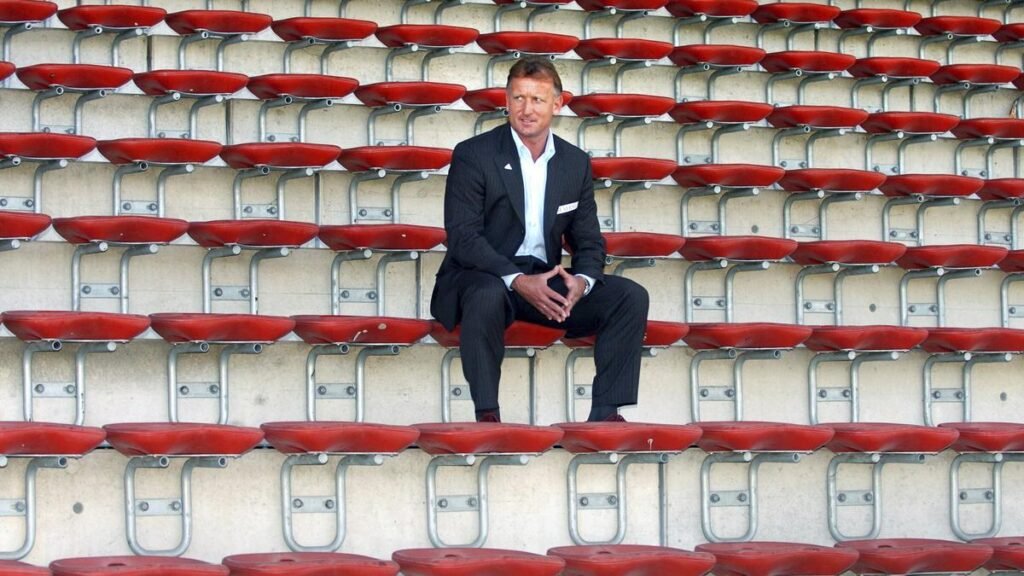Andreas Brehme, the hero of Germany’s 1990 World Cup victory, has passed away. Brehme won the nation’s admiration when he converted a late penalty in the final match, securing a 1-0 victory for West Germany over Diego Maradona’s Argentina after team captain Lothar Matthäus faced equipment issues. His partner, Susanne Schaefer, informed Germany’s dpa news agency on Tuesday that he passed away “suddenly and unexpectedly” during the night from a cardiac arrest. He was 63 years old
Rudi Völler, a national teammate, expressed profound sadness, stating, “I can’t believe it at all. The news of Andreas’ sudden death makes me incredibly sad. Andi was our World Cup hero, but for me, he was much more. He was my close friend and companion to this day. I will miss his wonderful love of life.”
Affectionately known as “Andi” Brehme, the Hamburg-born player was a standout in German soccer during the 1980s and 1990s. Primarily playing as an attacking left-back, he will forever be linked with the 1990 World Cup triumph.
Brehme’s contributions were significant, scoring in the semifinal against England, a match eventually won by West Germany on penalties, and clinching the final with his decisive penalty. The victory sparked nationwide celebrations in Germany, a poignant moment as the country was undergoing reunification following the fall of the Berlin Wall the previous year.
Brehme’s championship-sealing goal in Rome was doubly celebrated, not only at the Stadio Olimpico where the match took place but also in Inter Milan, the Italian club where he was a pivotal player alongside his German compatriots Matthäus and Jürgen Klinsmann.
As the captain, Matthäus would typically have been the one to take West Germany’s crucial penalty in the final. However, fate intervened when he broke his boots during the first half, leaving him lacking confidence with his substitute pair being too large.
Reflecting on the decisive moment, Matthäus remarked, “It was a wise decision to entrust Andreas Brehme with the penalty.” Meanwhile, Brehme himself recalled, “It was a matter of someone stepping up. What mattered most was ensuring the penalty found the net, securing our status as world champions.” These insights were shared by the players in separate interviews, offering a glimpse into the pivotal moments of that historic match.
Brehme openly acknowledged the contentious nature of the penalty decision, yet this did not deter him from calmly dispatching the spot kick past the previously unbeatable Argentine goalkeeper, Sergio Goycochea, in the 85th minute. Throughout the match, West Germany had exerted dominance, only to be thwarted repeatedly by Goycochea’s inspired goalkeeping.
On that memorable night at the Olimpico, facing off against the formidable Goycochea, who had already demonstrated his prowess by denying Donadoni and Aldo Serena in earlier matches, Brehme made a decisive choice. Opting to strike with his right foot, he delivered a precisely placed shot, almost tenderly guided towards the goal: a low, unstoppable trajectory into the bottom left corner.
As Brehme wheeled away in jubilation, his contribution to Inter’s successes was already deeply ingrained. Having played an instrumental role in securing the Serie A title for Inter in 1989, he would later add to his accolades by clinching the UEFA Cup with the club two years thereafter.
Describing him as a magnificent player and a true Interista, Inter bid farewell to Brehme, honoring his legacy by announcing that the team would don black armbands during their upcoming Champions League match against Atlético Madrid.
Brehme’s illustrious career also encompassed domestic triumphs, including two Bundesliga titles. His first came with Bayern Munich in 1987, followed by a remarkable achievement with promoted Kaiserslautern in his final season before retirement in 1998.
In total, Brehme dedicated 10 seasons to the Red Devils across two separate periods. His tenure included a notable triumph when he secured the German Cup with Kaiserslautern in 1996, a bittersweet achievement as it coincided with the club’s relegation from the Bundesliga. In a poignant moment, Brehme was seen shedding tears, comforted by Bayer Leverkusen’s Völler amidst the disappointment. However, his story with the club would later take a joyous turn with their Bundesliga triumph two years hence.
Following Brehme’s unexpected passing, Kaiserslautern expressed deep sorrow, announcing plans for tributes in the days to come to honor his memory.
Karl-Heinz Rummenigge, who shared the field with Brehme during the 1986 World Cup in Mexico, reminisced fondly about their time together. “Andi exemplified the qualities of a great team player: loyalty, dependability, and a contagious love of life. It saddens me deeply that he has left us at the age of 63,” Rummenigge remarked, reflecting on Brehme’s impact both on and off the pitch.
Brehme’s journey also took him to Spain, where he plied his trade for Real Zaragoza before embarking on his second spell with Kaiserslautern, further enriching his storied career with diverse experiences across different leagues.
Following his triumph in the Bundesliga with Kaiserslautern, he transitioned into coaching, initially remaining with the same club. Under his guidance, Kaiserslautern reached the semifinals of the UEFA Cup in 2001. Subsequently, he took charge of second-division Unterhaching. His coaching journey culminated with a role as assistant to coach Giovanni Trapattoni at Stuttgart during the 2005-06 season.
Brehme’s passing comes shortly after the loss of his friend Franz Beckenbauer, who coached the World Cup-winning team in 1990.
Reflecting on his relationship with Beckenbauer, Brehme shared, “As a young boy, I had, like probably every boy in Germany, a Franz Beckenbauer poster hanging above my bed. Later, he became my boss, and I could work with him. And in the end, we became close friends. So I have a lot to thank Franz for.”
Brehme’s illustrious playing career saw him earn 86 international caps for West Germany and unified Germany.
Bernd Neuendorf, president of the German soccer federation, remarked, “He was one of Germany’s greatest and best players of all time. German football owes him a lot.”
